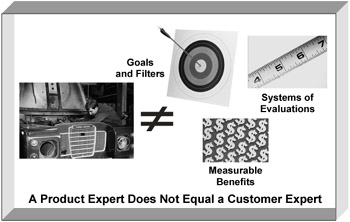Business Questions, Not Product Statements, Demonstrate Expertise
You let customers know how well you understand their business by the questions you ask. When you recite large amounts of technical facts about your products, you reflect only how well you understand your products. Nevertheless, a common myth prevails among salespeople that product experts are customer experts.
It is easy to understand the roots of this myth. If your sales training was typical, it mainly involved learning features and benefits. There is one slight problem: Your customers do not have features and benefits; they only have goals and filters. Conflict and inefficiency result when salespeople focus only on their products. When you do as you were trained, it is easy to understand why your customers justifiably feel that their interests sometimes come second.
Your product expertise is a given; how you use this knowledge as a building block to be a customer expert is not. You need to know your products inside and out so that you no longer think about them. This frees you up to concentrate on the customers. The appropriate time for you to discuss products will arrive; however, it is not immediately after you introduce yourself.
Example
Barry Olsen, head of purchasing, contacts two competing salespeople to find out who can best help him reduce inventory costs. Barry starts the meeting with the first salesperson, Joan Harkins, by asking her to explain how her products reduce inventory costs. "What an excellent opportunity," Joan thinks. She responds with a ten-minute-long scripted pitch monologue. On automatic pilot, Joan describes how her products will accomplish the goal through one high-tech feature after another. When she finally asks some questions, they all focus on whether Barry sees how her products would be able to reduce inventory costs (whatever that means). Barry tells Joan that he needs time to absorb all the information. He politely omits that he needs time to recover from boredom.
The second salesperson, Lynn Smyth, starts the meeting much differently. Before explaining how her products reduce inventory costs, she asks one of those questions that makes the difference between success and failure. Lynn asks Barry how he calculates inventory costs. Barry either (1) explains his methods or (2) asks Lynn what she means. Either response produces a desirable outcome.
With the first response, Barry explains his cost calculations. Lynn then determines which of her products (if any) would achieve his goals beyond any doubt. She also asks Barry whether he feels his current calculations capture all relevant costs. Lynn wants to make sure she fully understands how Barry measures inventory costs.
With the second response, Lynn responds to Barry's question about what she means by "calculating inventory costs." This question allows Lynn to explain new methods—that is, systems of evaluation—Barry's peers in the industry use to calculate inventory costs. She then details them and asks Barry if these methods are relevant to his inventory-reduction goals.
Of course, it would be purely coincidental if these SOEs accurately reflected the attainment of Barry's goals and matched up to the unique strengths of Lynn's products. Again, nothing prepares Lynn better than having a Market Profile sheet specific to Barry's industry that she can review before meeting with him. This preparation ensures that you, like Lynn, will not ask a question that you cannot answer.
Which salesperson do you think Barry or any other customer will consider more of an expert? Which one do you think is more of an expert?
Fortunately, you can easily break the product feature habit. Just concentrate on questioning customers about their goals. Announce to the customers your focus on understanding their goals. Make it the stated purpose of your first in-person meetings. Customers find it refreshing to discuss their goals, because it does not happen that often.
| Note | For good measure, leave your glossy product literature in the car. Save your brochures for a time when you understand your customer's goals and filters. Do not use them before then. (General capabilities brochures and industry-specific case studies are acceptable and useful.) |
Customers trust salespeople who are customer experts. They know customer experts build solutions from their goals down, not from your products' features up. Your questions about their goals and filters let customers know that you put their interests first. When you make customers' goals and filters measurable, you sell on value, not price, and exceed customers' expectations. Everyone wins—if you use active listening and questioning skills. (See Exhibit 5-1.)

Exhibit 5-1: Become a customer expert.
EAN: 2147483647
Pages: 170